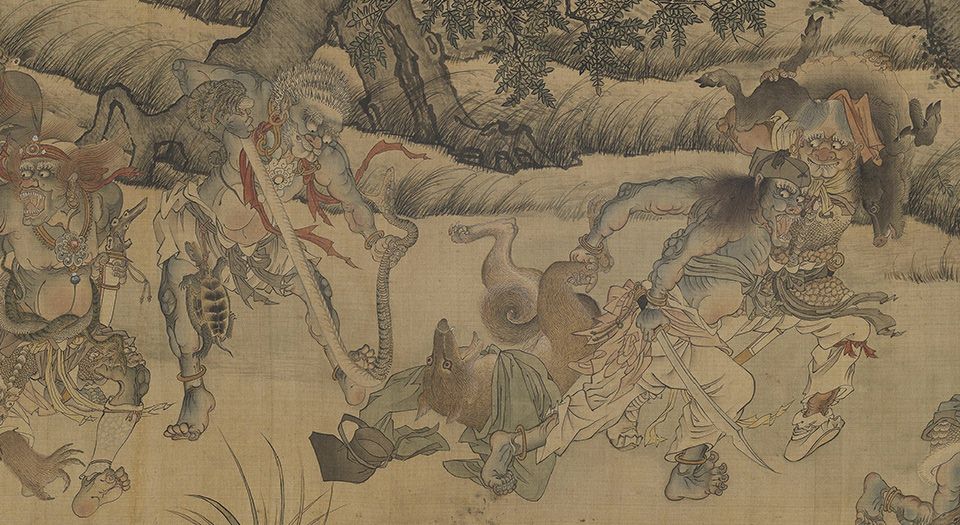In Hangzhou, there was an elderly man surnamed Qiu who was a cloth merchant. One day, Qiu went to collect debts and returned late. The inn was fully occupied, and ahead lay desolate areas with no place to stay. Qiu discussed with the innkeeper, who said, ‘Old friend, I wonder if you’re brave enough? I have a small building behind the back wall, but it’s been uninhabited for a long time. I fear it might be haunted, so I dare not offer it to you.’ Qiu replied, ‘I’ve traveled tens of thousands of miles in my life; what fear do I have of ghosts?’
The innkeeper then took a candle and led Qiu through the building to the back wall. There, they found an empty space, roughly four or five acres, with several small buildings neatly constructed along the wall. Qiu inspected one of the rooms and found it fully furnished with tables, chairs, beds, and curtains, which delighted him. After bidding farewell, the innkeeper left, and because of the heat, Qiu sat outside the door to settle his accounts.
That night, under the hazy moonlight, Qiu faintly sensed figures passing in front of him. Suspicious of thieves, he searched carefully. Suddenly, he saw shadowy figures flit by, twelve in quick succession, moving erratically like butterflies among flowers, without a pattern. Upon closer inspection, they were all beautiful women. Qiu remarked, ‘People fear ghosts because they are usually ugly and evil-looking. But now, since these ghosts are so alluring and enchanting, I’ll consider them as beautiful women.’ So, he sat upright, observing the ghostly figures to see what transformations would occur.
Before long, two ghosts squatted before him, one ghost climbed onto the shoulders of the other, nine more ghosts climbed up one after another, and finally, one ghost floated to the top, resembling a stacked pagoda as seen in a theater. After a while, the ghosts each took a large hoop and wore them around their necks, their hair let loose, and tongues extending over a foot long. Qiu chuckled and said, ‘When beautiful, excessively so, and when ugly, excessively so. This back and forth resembles the ways of the world. Let’s see how you end up!’
With that, the ghosts burst into laughter, reverting to their original forms and dispersing in a commotion.
Translated from 《鬼寶塔》 in 《子不語》:
杭人有邱老者,販布營生。一日取帳回,投宿店家,店中人滿。前路荒涼,更無止所,與店主商量。主人云:「老客膽大否?某後墻外有骰子房數間,日久無人歇宿,恐藏邪祟,未敢相邀。」邱老曰:「吾計半生所行,不下數萬里,何懼鬼為?」於是主人執燭,偕邱老穿室內行至後墻外,視之:空地一方,約可四五畝,貼牆矮屋數間,頗潔淨。邱老進內,見桌椅牀帳俱全,甚喜。主人辭出,邱老以天熱,坐戶外算帳。
是夕淡月朦朧,恍惚間似前面有人影閃過,邱疑賊至,注目視之,忽又一影閃過,須臾,連見十二影,往來無定,如蝴蝶穿花,不可捉摸。定睛熟視,皆美婦也。邱老曰:「人之所以畏鬼者,鬼有惡狀故也。今豔冶如斯,吾即以美人視鬼可矣。」遂端坐看其作何景狀。
未幾,二鬼踞其足下,一鬼登其肩,九鬼接踵以登,而一鬼飄然據其頂,若戲場所謂「搭寶塔」者然。又未幾,各執大圈齊套頸上,頭髮俱披,舌長尺餘。邱老笑曰:「美則過于美,惡則過于惡,情形反覆,極似目下人情世態,看汝輩到底作何歸結耳!」言畢,群鬼大笑,各還原形而散。

